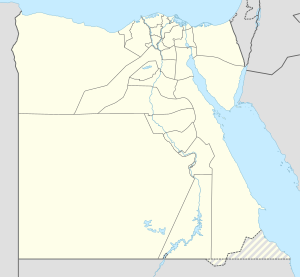Abbassia
 From Wikipedia the free encyclopedia
From Wikipedia the free encyclopedia
Abbassia العباسية | |
|---|---|
District | |
Clockwise: El Nour Mosque, St. Peter's Church, Zaafaranah Palace, Karaite Jewish Temple, Qubba al-Fadawiyya | |
| Coordinates: 30°03′54″N 31°16′18″E / 30.065008°N 31.27171°E | |
| Country | |
| Governorate | Cairo Governorate |
| Time zone | UTC+2 (EST) |
Abbassia (Arabic: العباسية Egyptian Arabic pronunciation: [elʕæb.bæˈsej.jæ]) is a neighbourhood that makes up five shiakhas (census blocks) in al-Wayli district in Cairo, Egypt.[1]
The Saint Mark's Coptic Orthodox Cathedral, Cairo is located in Abbassia.[2] The medical faculty of Ain Shams University and its affiliate hospital units are located in Abbassia.[3] The Abbassia metro station is located here, as well.
History[edit]
The modern district of Abbassia is named after Abbas Helmy Pasha and was built upon an older Coptic village called p-Sovt em-p-Hoi (Coptic: ⲡⲥⲟⲃⲧ ⲙ̀ⲡϩⲟⲓ Coptic pronunciation: [psoβt əmˈphoj] "the wall of the moat") or later Shats (Coptic: ϣⲁⲧⲥ "the moat") which is a calque on the latter Arabic al-Khandaq (Arabic: الخندق "the moat").[4][5][6]
In 1865 an observatory, principally for meteorological work, was founded at Abbassia, by the Khedive Isma'il Pasha, and maintained continuously there for nearly forty years. The building lay on the boundary between the cultivated Nile Delta and the desert but then with urban encroachment, it was decided in 1904, to move the meteorological work to Helwan.[7] The Observatory at Abbassia was an empty monument until 1952.[8][9]
Abbassia and the nearby region, saw heavy rainfall during a period of time geological researchers call the Pluvial Abbassia. During this period, red, green and purple rocks or gravel became distributed all along the valley and Delta regions of the Nile. Gravel beds were formed, including a famous gravel bed at Abbassia. Photographed and described in 1926 by Paul Bovier-Lapierre, these gravel beds were as thick as 33 feet (10 metres/meters) in some areas.[10]
In the Second World War, during which Egypt was the scene of heavy fighting, the United Kingdom located its Royal Armoured Corps School in Abbassia.[11] In September 1941, an Italian Air Force plane bombed a British Army depot in Abbassia.[12]
The Cathedral of Saint Mark in Abbassia was the site of the 2012 funeral for Coptic Pope Shenouda III of Alexandria, attracting more than two million mourners from around the world.[2] A queue of over one kilometer in length formed to view the body of the pope, and as people pushed to get close, three people were crushed to death and 137 were injured.[13][14]
During the continued 2012 protests of the Egyptian Revolution of 2011, Abbassia was the scene of confrontations between protesters and armed gangs. On December 11, 2016 a chapel next to the Saint Mark's Coptic Orthodox Cathedral was the site of a suicide bombing against Egypt's Coptic community. Of the 25 Copts who died in the explosion, most were women and children. The army was deployed to the site and Egypt began three days of mourning.[15][16]
See also[edit]
References[edit]
- ^ Central Agency for Public Mobilisation and Statistics (CAPMAS) (2017). "2017 Census for Population and Housing Conditions". CEDEJ-CAPMAS. Retrieved 2023-02-21.
- ^ a b Tovrov, Daniel (March 19, 2012). "Egypt: Three Dead After Vigil For Coptic Christian Pope". International Business Times. Archived from the original on 5 January 2016. Retrieved 31 October 2015.
- ^ "Address". ASU. Archived from the original on 26 November 2016. Retrieved 21 November 2016.
- ^ Gabra, Gawdat; Takla, Hany N. (2017). Christianity and Monasticism in Northern Egypt: Beni Suef, Giza, Cairo, and the Nile Delta. Oxford University Press. ISBN 978-977-416-777-5.
- ^ "Khandaq, Al- :: Claremont Coptic Encyclopedia". ccdl.libraries.claremont.edu. Retrieved 2020-06-14.
- ^ Casanova, Paul. "Les noms coptes du Caire et localités voisines". BIFAO. 1: 139–224.
- ^ Keeling, B. F. E. (1907). "Helwan Magnetic Observatory, Egypt". Terrestrial Magnetism and Atmospheric Electricity. 12 (4): 149. Bibcode:1907TeMAE..12..149K. doi:10.1029/TE012i004p00149.
- ^ Keeling, Bertram Francis Eardley (1907). The Climate of Abbassia, Near Cairo. National printing Department. Retrieved 7 November 2016.
- ^ "Helwan Observatory - UNESCO". UNESCO. Archived from the original on 7 November 2016. Retrieved 7 November 2016.
- ^ Said, Rushdi (December 6, 2002). The Geological Evolution of the River Nile. Springer Science & Business Media. p. 59. ISBN 9781461258414. Retrieved 7 November 2016.
- ^ West, Nigel (September 2, 2009). The A to Z of British Intelligence. Scarecrow Press. p. 1. ISBN 9780810870284. Retrieved 7 November 2016.
- ^ Richard Overy, (Penguin, 2013) The Bombers And The Bombed: Allied Air War Over Europe, 1940-1945, p. 333
- ^ AsiaNews (March 19, 2012). "Pope sends message for Shenouda III's death, huge crowds form to see his body". AsiaNews. AsiaNews Italy. Archived from the original on 15 October 2012. Retrieved 31 October 2015.
- ^ AFP (March 20, 2012). "Thousands attend funeral of Coptic Pope Shenouda III". The Telegraph. Archived from the original on 5 January 2016. Retrieved 31 October 2015.
- ^ Abdelhadi, Magdi (3 May 2012). "Egyptians take Tahrir Square to the junta's doorstep". guardian.co.uk. London: The Guardian. Archived from the original on 8 November 2014. Retrieved 7 December 2012.
- ^ "List of attacks on Christians churches, institutions and individuals in Egypt". Bishop Angaelos. Archived from the original on 2016-12-21.







